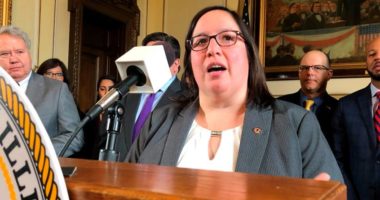Study Sponsor Targets Passage Of Online Casino Legislation In 2023


A study on online betting may lead to serious considerations about its legalization in Illinois in 2022. However, the senator who commissioned the research believes that 2023 is a more viable timeline for Illinois to permit online gaming.
Senator Cristina Castro, as shown above, has informed Play Illinois that the study on online casinos is beginning to educate her colleagues. This method is currently the only one being used. If suitable, it will be applied to Illinois.
I’m uncertain about the feasibility of accomplishing this within a year. We have to address people’s apprehensions and deal with VGTs. There’s a need to take time to clarify to my colleagues what iGaming entails and what it does not. Possibly, we could lay the foundation in 2022 and think about implementing it in 2023.
In 2021, virtual game bills don’t gain any traction.
This session, Rep. Bob Rita proposed a bill to permit online casino gambling. However, the bill was largely overlooked during and following an April committee hearing.
Then, at the end of the session, Rita did not incorporate the proposal into the omnibus gaming bill that he pushed through the House.
“Tom Swoik, the executive director of the Illinois Casino Gaming Association, told Play Illinois that he is not a fan of iGaming, despite Rita’s openness to considering legislation on online gambling.”
This marked the first month of a two-year legislative program for Illinois. Hence, the online gaming laws introduced in 2020 will come into effect in 2021.
“Swoik said, “We won’t be starting from scratch, but we’ll be damn near it.”
October research on online gambling in Illinois
In May 2020, when they were shut down due to the pandemic, Swoik and Illinois casinos started advocating for online casinos.
The Grand Victoria Casino along with nbsp are situated in Castro’s locality. She noticed the impact its extended closures during the crisis had on local businesses and employment.
She put forward SR 303 to encourage further dialogue on iGaming. The resolution calls for the Commission on Government Forecasting and Accountability to produce a report by October 1st, providing an estimate of the extra tax revenue Illinois could have generated had it allowed online casino gambling during the pandemic.
The Senate voted to pass the solution on June 1, the final day of the ordinary legislative session, according to Castro’s remarks.
Observations on the closure of physical businesses in several game-holding states during the peak of the pandemic led to the creation of Senate Resolution 303. Notably, states such as Pennsylvania and New Jersey did not experience losses due to their iGaming revenue.
The government will carry a filibuster treatment in October.
The Illinois government is set to convene for a veto period immediately after the report’s return, as it happens.
At this time, lawmakers are hoping to pass Rita’s gaming bill through the House and onto the governor’s desk. The bill includes provisions for wagering on in-state college teams.
Swoik stated that the probability of iGaming being subject to any kind of voting in October is extremely slim or practically non-existent.
Castro agreed that despite the report’s due date, online gaming will not be discussed this year.
“This is a large item that necessitates careful consideration, discussion, and of course, implementation. It couldn’t possibly be finished within a single program.”
Swoik theorizes that the government may be growing weary of gaming. There hasn’t been a significant increase in revenue from the latest comprehensive gambling expansion. While new games have been approved, they have yet to be launched.
Swoik stated that even though we enacted a significant game expansion bill two years ago, it hasn’t produced many results, indicating a certain level of hesitation. While sports betting has been gaining momentum, it’s only been around for about forty years. Hence, there seems to be some hesitance to venture into new areas until that fully takes off.
Legislators need more time to learn about iGaming.
Using the study’s data, Castro plans to educate his coworkers about online gambling the following year.
“She said, “I believe that data is crucial. I believe it will be helpful to continue the discussion of whether that’s a path we should consider going down if the data supports it and we can see how it has worked in other states.”
Castro made a comparison between the legalization of marijuana and iGaming. Despite the initial apprehension it caused among lawmakers, she believes that the system turned out to be beneficial for the state.
We need to show them what iGaming is and how it’s evolving. It’s no longer just the default form of betting. It’s much more sophisticated now and has safeguards to prevent access by young people.
She contends that Illinois’ successful implementation of online sports betting without any problems supports the argument.
Castro commented, “We have not been involved in sports betting for a long time. It’s easier to inform colleagues that we have ventured into sports wagering and have implemented various safety precautions, provided we continue on the right path.”







